Hello dog lovers, today Treatment of environmental allergies in GSD is my topic. Here I will tell you the 10 steps of treatment in detail. You must adopt these steps one by one for the complete removal of environmental allergies from your GSD.
Environmental allergies can significantly impact the health and well-being of German Shepherds, leading to uncomfortable symptoms such as itching, skin irritation, and inflammation. These allergies are often caused by various environmental factors, including pollen, dust mites, mold, and grass.
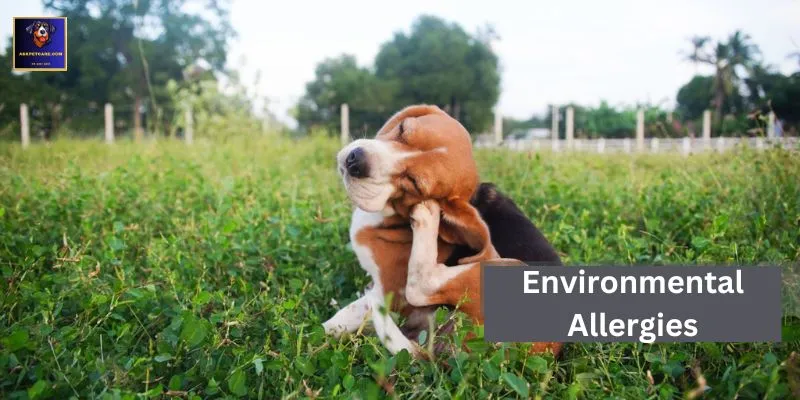
Managing environmental allergies in German Shepherds requires a complete approach that involves identifying allergens, reducing exposure, and implementing treatment strategies to alleviate symptoms and improve the dog’s quality of life. By understanding the causes and implementing effective management techniques, pet owners can help their German Shepherds thrive despite environmental allergens.
Hello everyone who loves dogs! I’m Dr. Arif Aziz, and I’ve been taking care of pets especially dogs at my clinic for a long time, exactly 14 years! I’m here to share some valuable information with you that I’ve gathered from books during my study time written by experts in veterinary medicine (DVM) and MSC (Master of Science), as well as from my own experiences working with dogs.
Treatment of environmental allergies in GSD: 15 methods.
Firstly understand 10 common causes of environmental allergies in German Shepherds:
- Pollen: Pollen from trees, grasses, and weeds can trigger allergic reactions in German Shepherds, especially during peak pollen seasons.
- Dust Mites: These microscopic pests thrive in household dust, carpets, bedding, and upholstery, causing allergic reactions in sensitive dogs.
- Mold Spores: Mold spores present in damp environments, such as basements, bathrooms, and outdoor areas, can lead to allergic responses in German Shepherds.
- Grasses: Certain types of grasses, such as Bermuda grass or Kentucky bluegrass, can produce pollen that triggers allergic reactions in dogs when inhaled or contacted.
- Weeds: Common weeds like ragweed, sagebrush, and pigweed can release pollen that induces allergic symptoms in German Shepherds.
- Trees: Tree pollen from species like oak, cedar, and birch can cause allergic reactions in dogs, especially during the spring and fall seasons.
- Fungi: Various types of fungi, including yeast and mildew, can grow in damp environments and trigger allergic responses in German Shepherds.
- Insect Bites: Bites from insects like mosquitoes, ants, fleas, and ticks can introduce allergens into the dog’s bloodstream, leading to allergic reactions.
- Chemicals: Exposure to household cleaners, detergents, pesticides, and other chemicals can irritate the skin and respiratory system, exacerbating allergic symptoms in German Shepherds.
- Outdoor Allergens: Outdoor allergens such as air pollution, vehicle exhaust, and industrial emissions can contribute to allergic reactions in German Shepherds, particularly in urban environments.
Identifying and addressing these potential causes can help manage environmental allergies in German Shepherds and improve their quality of life.
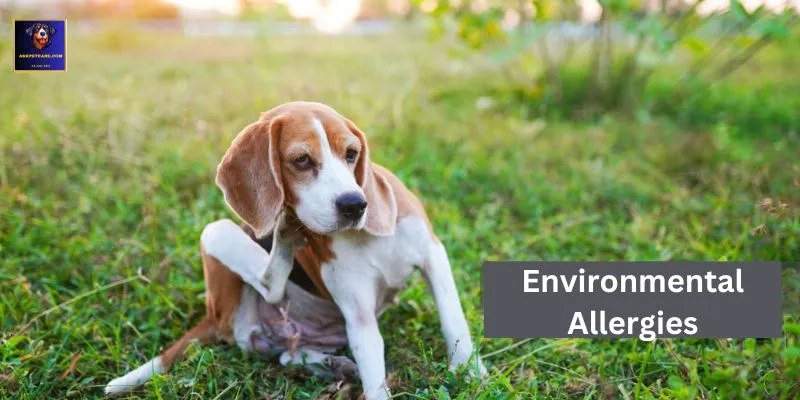
For better understanding here’s the information presented in a simple table format:
| Causes of Environmental Allergies in German Shepherds |
| 1. Pollen |
| 2. Dust Mites |
| 3. Mold Spores |
| 4. Grasses |
| 5. Weeds |
| 6. Trees |
| 7. Fungi |
| 8. Insect Bites |
| 9. Chemicals |
| 10. Outdoor Allergens |
This table lists common causes of environmental allergies in German Shepherds. Understanding these triggers can help pet owners identify and manage their dog’s allergic reactions effectively.

Now we understand the Treatment of environmental allergies in GSD: 15 steps.
my related article.
seasonal-allergies-in-german-shepherds.
How do vets treat environmental allergies?
Identify Allergens: Treatment of environmental allergies in GSD.
-
- Observe your dog’s symptoms and note environmental factors.
- Consider allergy testing to pinpoint specific allergens.
- Consult with your veterinarian to identify potential triggers.
Reduce Exposure:
-
- Keep your dog indoors during peak pollen seasons.
- Limit outdoor activities to early morning or late evening.
- Close windows and use air conditioning during high pollen counts.
Use Air Purifiers:
-
- Install HEPA air purifiers in your home.
- Place air purifiers in rooms where your dog spends most of their time.
- Change air purifier filters regularly to maintain effectiveness.
Regular Cleaning:
-
- Wash your dog’s bedding and toys frequently in hot water.
- Vacuum carpets, rugs, and upholstery regularly.
- Use allergen-proof covers on your dog’s bed and furniture.
Hypoallergenic Shampoos: Treatment of environmental allergies in GSD.
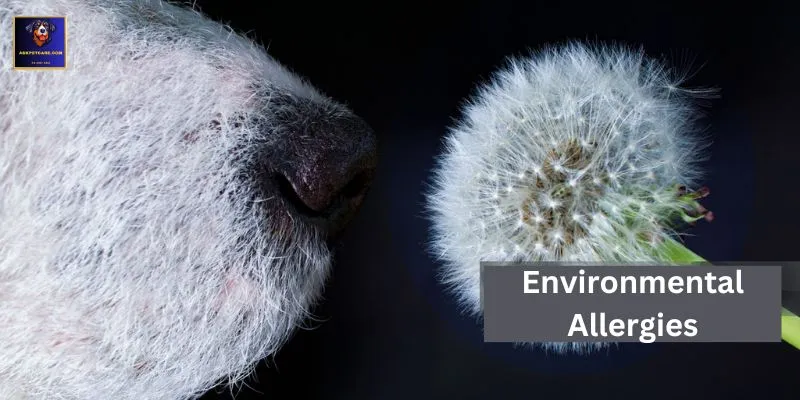
-
- Choose shampoos specifically formulated for dogs with allergies.
- Bathe your dog with hypoallergenic shampoo once a week.
- Rinse thoroughly to remove all traces of shampoo.
Grooming:
-
- Brush your dog’s coat outside to remove pollen and other allergens.
- Trim your dog’s fur regularly to reduce allergen buildup.
- Check for hot spots or skin irritations during grooming sessions.
Allergy Testing:
-
- Discuss allergy testing options with your veterinarian.
- Consider blood tests or intradermal skin testing.
- Use test results to develop an allergy management plan.
Medications:
-
- Administer prescribed antihistamines as directed by your vet.
- Use corticosteroids for short-term relief of severe symptoms.
- Explore immune-modulating drugs for long-term management.
Immunotherapy:
-
- Start immunotherapy under the guidance of a veterinary allergist.
- Gradually increase allergen exposure to desensitize your dog’s immune system.
- Monitor for adverse reactions during the immunotherapy process.
Nutritional Supplements:
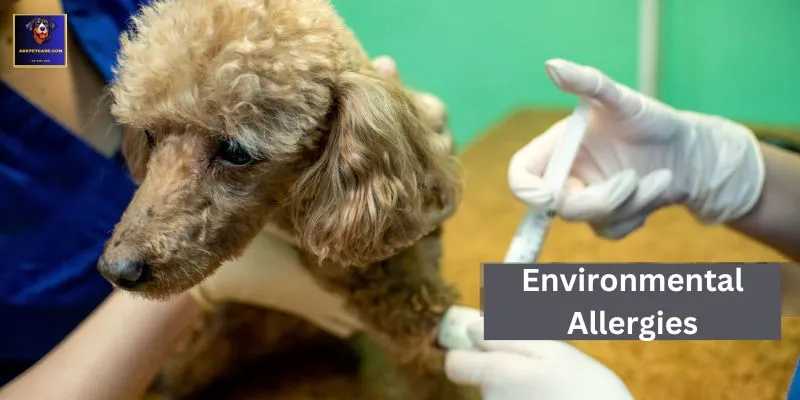
-
- Provide omega-3 fatty acid supplements to support skin health.
- Consider supplements containing vitamins and antioxidants.
- Consult your vet for recommended dosages and brands.
Dietary Changes:
-
- Transition to a hypoallergenic or limited-ingredient diet.
- Avoid common allergens such as beef, chicken, and grains.
- Monitor your dog’s response to dietary changes and adjust as needed.
Avoid Irritants:
-
- Keep your dog away from areas with heavy smoke or strong odors.
- Choose unscented cleaning products and detergents.
- Minimize exposure to airborne pollutants and chemicals.
Moisturized Skin: Treatment of environmental allergies in GSD.
-
- Use hypoallergenic moisturizers or emollients recommended by your vet.
- Apply moisturizer after bathing to lock in moisture.
- Avoid products containing fragrances or harsh chemicals.
Cool Baths:
-
- Use lukewarm water to prevent further irritation.
- Add colloidal oatmeal or baking soda to soothe itchy skin.
- Pat your dog dry gently with a soft towel after bathing.
Consult Your Vet Regularly:
-
- Schedule routine check-ups to monitor your dog’s allergy symptoms.
- Discuss any changes in your dog’s condition or treatment response.
- Follow your vet’s recommendations for long-term allergy management.
I hope you will thoroughly understand the Treatment of environmental allergies in GSD. If still have any query contact me.
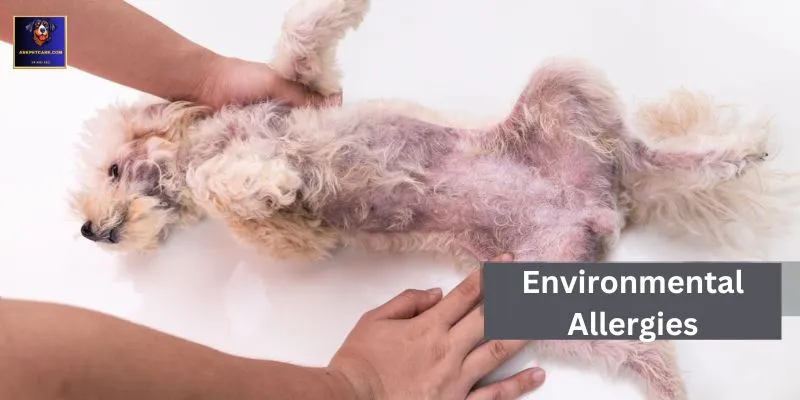
Conclusion: Treatment of environmental allergies in GSD.
In conclusion, environmental allergies pose significant challenges for German shepherd owners, but with proactive management and veterinary guidance, these challenges can be addressed effectively.
By identifying allergens, reducing exposure, and utilizing treatment options such as medications, immunotherapy, and dietary modifications, pet owners can help alleviate their German shepherd’s symptoms and improve their overall well-being.
It’s essential to work closely with a veterinarian to develop a tailored treatment plan that addresses the specific needs of each dog. With dedication and proper management, German Shepherds with environmental allergies can lead happy, comfortable lives.
- Question: What are the symptoms of environmental allergies in German Shepherds?
- Answer: Symptoms may include itching, redness, skin inflammation, ear infections, and hair loss.
- Question: Can I give my German shepherd over-the-counter antihistamines for allergies?
- Answer: It’s not recommended to give over-the-counter medications without consulting a veterinarian as some may be harmful or ineffective for dogs.
- Question: How can I reduce my German shepherd’s exposure to allergens?
- Answer: Keep your dog indoors during peak pollen seasons, use air purifiers, clean bedding regularly, and avoid outdoor activities during high pollen counts.
- Question: Are there any specific dog foods that help with environmental allergies in German Shepherds?
- Answer: Some hypoallergenic or limited-ingredient dog foods may help reduce allergic reactions, but consult with a vet for proper dietary recommendations.
- Question: Is immunotherapy effective for treating environmental allergies in German Shepherds?
- Answer: Immunotherapy, or allergy shots, can be effective in desensitizing dogs to specific allergens over time, but results may vary for each dog.
-

Treatment of environmental allergies in GSD
Here are some reference books that are considered authoritative on the topic:
These books cover a range of topics related to dermatology and skin diseases in dogs, including diagnosis, treatment, and management of skin conditions.
- “Muller and Kirk’s Small Animal Dermatology” by William H. Miller Jr. DVM DACVD, Craig E. Griffin DVM DACVD, Karen L. Campbell DVM DACVD :
- “Skin Diseases of the Dog and Cat” by Nicole A. Heinrich DVM DACVD, Melissa Eisenschenk DVM DACVD – :
- “Canine and Feline Dermatology Drug Handbook” by Sandra N. Koch DVM MS DACVD, Cheryl S. Hedlund DVM MS DACVD :
Disclaimer: This information is general advice only. Before starting any treatment or supplement with your pet, please consult your vet first for the best approach to getting your pet back to its best health.
Check with your veterinarian before giving any medication or supplement at home, to be sure it’s safe for your pup. Some substances can be toxic or harmful, including “dog-safe” medications and supplements if they are given at the wrong dosage.
